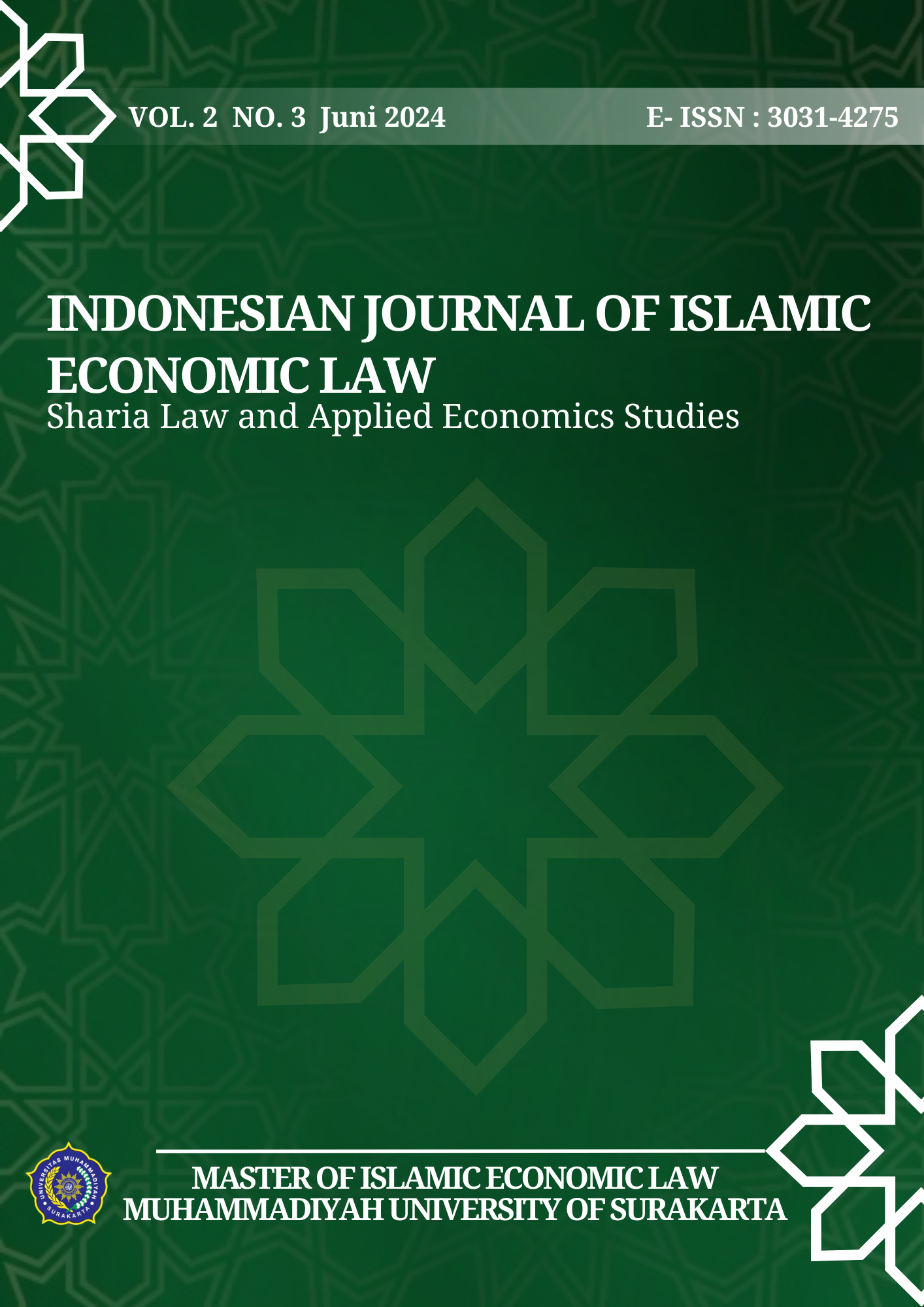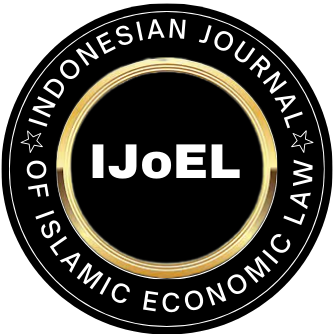Effectiveness of Halal Traceability and Self-Declared Certification on Indonesian MSMEs Performance
DOI:
https://doi.org/10.23917/ijoel.v1i2.4816Keywords:
traceability, self-declaring, halal certification, SME performanceAbstract
This study aims to examine in depth the effectiveness of halal tracea-bility in Indonesia and identify the impact of self-declared halal certifi-cation on the performance of small and medium-sized enterprises (SMEs) in the country. The research method used is qualitative, which is reinforced by statistical analysis through survey data from the Popu-lix application as well as a comprehensive literature review. Data anal-ysis was conducted through various techniques, including regression tests, correlation tests, chi-square tests, and content analysis. The re-search findings confirm that the effectiveness of the halal tracking sys-tem significantly contributes to improving the resilience and competi-tiveness of MSMEs. Moreover, self-declared halal certification has been proven to increase consumer confidence in halal products and their integrity. This research makes an important contribution by high-lighting the urgency of integrating efficient halal supply chain man-agement practices, including reliable tracking systems and credible cer-tification. Furthermore, this research underscores the necessity of en-hancing consumer awareness of halal products, thereby facilitating in-formed purchasing decisions and fostering the growth of a more resili-ent halal ecosystem in Indonesia.
Downloads
References
Abdullah, S., and U.A. Oseni. "Towards a Sharī'ah Compliant Equity-Based Crowdfunding for the Halal Industry in Malaysia." International Journal of Business and Society 18, no. S1 (2017): 223–240.
Amalia, Euis, and Eltom Ishaq Osman Musa. "Economic Compatibility of Islamic Economy and Pancasila: Implications for the Postgraduate Curriculum." Indonesian Journal of Islamic Economic Law 1, no. 1 (December 7, 2023): 11–22. https://journals2.ums.ac.id/index.php/ijoel/article/view/3434.
Dini Wahyuni, and Nurul Arfidhila. "Traceability Pada Rantai Pasok Pangan Halal: Review Literatur." Talenta Conference Series: Energy and Engineering (EE) 2, no. 4 (2019).
Giyanti, I., A. Indrasari, W. Sutopo, and E. Liquiddanu. "Halal Standard Implementation in Food Manufacturing SMEs: Its Drivers and Impact on Performance." Journal of Islamic Marketing 12, no. 8 (2021): 1577–1602.
Hambali, Ahmad Imam, and Aisha Bahaaeldin Eprahim Ali. "Social Funding Programs in Non-Depository Credit Cooperatives: A Perspective on Positive Law and Sharia Principles." Indonesian Journal of Islamic Economic Law 1, no. 1 (December 7, 2023): 50–59. https://journals2.ums.ac.id/index.php/ijoel/article/view/3439.
Hossein, Zainal Arifin, and M Mahmudulhassan. "Legal Disruption and Sharia Arbitration: Navigating Change, Measuring Impact, and Fostering Innovation." Indonesian Journal of Islamic Economic Law 1, no. 1 (December 7, 2023): 39–49.
Isman, I, and Ahmad Zainul Muttaqin. "Innovative Legal Modelling for Interdisciplinary Studies on Law and Economic Behavior." Indonesian Journal of Islamic Economic Law 1, no. 1 (December 7, 2023): 60–71. https://journals2.ums.ac.id/index.php/ijoel/article/view/3437.
Istianah, Istianah, and Gemala Dewi. "Analisis Maṣlahah Pada Konsep Halal Self-Declare Sebelum Dan Pascaenachtment Undang-Undang Cipta Kerja." Al-Adl : Jurnal Hukum 14, no. 1 (2022): 85.
Kamarulzaman, N.H., N.A. Muhamad, and N. Mohd Nawi. "An Investigation of Adoption Intention of Halal Traceability System among Food SMEs." Journal of Islamic Marketing 13, no. 9 (2022): 1872–1900.
Kementerian, Perencanaan Pembangunan Nasional. Laporan Perkembangan Ekonomi Indonesia Dan Dunia TW II 2023. Jakarta, Indonesia, 2023. https://perpustakaan.bappenas.go.id/e-library/file_upload/koleksi/migrasi-data-publikasi/file/Update_Ekonomi/Ekonomi_Makro/2023/Laporan Perkembangan Ekonomi Indonesia dan Dunia TW II 2023 - Humas-halaman-2-167.pdf.
Khan, S., A. Haleem, M.I. Khan, M.H. Abidi, and A. Al-Ahmari. "Implementing Traceability Systems in Specific Supply Chain Management (SCM) through Critical Success Factors (CSFs)." Sustainability (Switzerland) 10, no. 1 (2018).
Mubarak, Jaih, and Shaifurrokhman Mahfudz. "Best Practice Review: Enhancing the Quality of Shariah Economist Scholars." Indonesian Journal of Islamic Economic Law 1, no. 1 (December 7, 2023): 1–10.
Muhamad, N.A., N.H. Kamarulzaman, and N.M. Nawi. "Agro-Food SMEs' Intention to Adopt Halal Traceability System." Food Research 4 (2020): 93–98.
Mujiatun, S., B. Trianto, E.F. Cahyono, and Rahmayati. "The Impact of Marketing Communication and Islamic Financial Literacy on Islamic Financial Inclusion and MSMEs Performance: Evidence from Halal Tourism in Indonesia." Sustainability (Switzerland) 15, no. 13 (2023).
Najmi, A., W. Ahmed, and S. Jahangir. "Firm's Readiness for Halal Food Standard Adoption: Assessing the Importance of Traceability System." Journal of Islamic Accounting and Business Research 14, no. 8 (2023): 1451–1473.
Nasyiah, T., I. Masudin, F. Zulfikarijah, D. Kannan, A. Rumijati, and R. Wijaya. "Explaining Sustainable Performance With SEM-FsQCA: The Role of Traceability Systems, Knowledge Management, Halal SCM Practices, and Spiritual Leadership in Small-Medium Enterprises (SMEs)." IEEE Transactions on Engineering Management 71 (2024): 5691–5705.
Nawi, N.M., H.N. Basri, N.H. Kamarulzaman, and M.N. Shamsudin. "Consumers' Preferences and Willingness-to-Pay for Traceability Systems in Purchasing Meat and Meat Products." Food Research 7, no. 1 (2023): 1–10.
Poniman, D., S. Purchase, and J. Sneddon. "Traceability Systems in the Western Australia Halal Food Supply Chain." Asia Pacific Journal of Marketing and Logistics 27, no. 2 (2015): 324–348.
Rafianti, Fitri, Robi Krisna, and Erwin Radityo. "Dinamika Pendampingan Manajemen Halal Bagi Usaha Mikro Dan Kecil Melalui Program Self Declare." Jurnal Sains Sosio Humaniora 6, no. 1 (2022): 636–643.
Razak, Ghadafi M., Linda C. Hendry, and Mark Stevenson. "Supply Chain Traceability: A Review of the Benefits and Its Relationship with Supply Chain Resilience." Production Planning and Control 34, no. 11 (2023): 1114–1134.
Saifudin, A.M., S.N. Othman, and E.M. Elias. "Critical Factors of the New Islamic Supply Chain Model through the Lens of Descriptive Data Analysis." International Journal of Supply Chain Management 6, no. 1 (2017): 203–208.
Shofawati, A. The Role of Islamic Fintech in Indonesia to Improve Financial Inclusion for Resolving SDGs. Artificial Intelligence, Fintech, and Financial Inclusion, 2023.
Sumarliah, E., T. Li, B. Wang, F. Fauziyah, and I. Indriya. "Blockchain-Empowered Halal Fashion Traceability System in Indonesia." International Journal of Information Systems and Supply Chain Management 15, no. 2 (2022).
Theodoridis, Theodoros, and Juergen Kraemer. "Pola Sinergitas Dalam Mekanisme Self Declare Halal" (n.d.): 149–178.
Vanany, I., D.I. Maftuhah, A. Soeprijanto, Sukoso, and M. Zulhafizh. "Modelling Halal Internal Traceability in Open Source ERP System for Chicken Meat Processing Company." In IEEE International Conference on Industrial Engineering and Engineering Management, 1017–1021, 2019.
Wahyuni, H., I. Vanany, and U. Ciptomulyono. "Food Safety and Halal Food in the Supply Chain: Review and Bibliometric Analysis." Journal of Industrial Engineering and Management 12, no. 2 (2019): 373–391.
Wijaya, I.F., A. Moro, and Y. Belghitar. "Does Religiosity Affect Financing Activity? Evidence from Indonesia." Business Ethics, the Environment and Responsibility 32, no. 2 (2023): 670–697.
Downloads
Submitted
Published
How to Cite
Issue
Section
License
Copyright (c) 2024 Siti Sadiyah, Emi Erawati

This work is licensed under a Creative Commons Attribution 4.0 International License.










